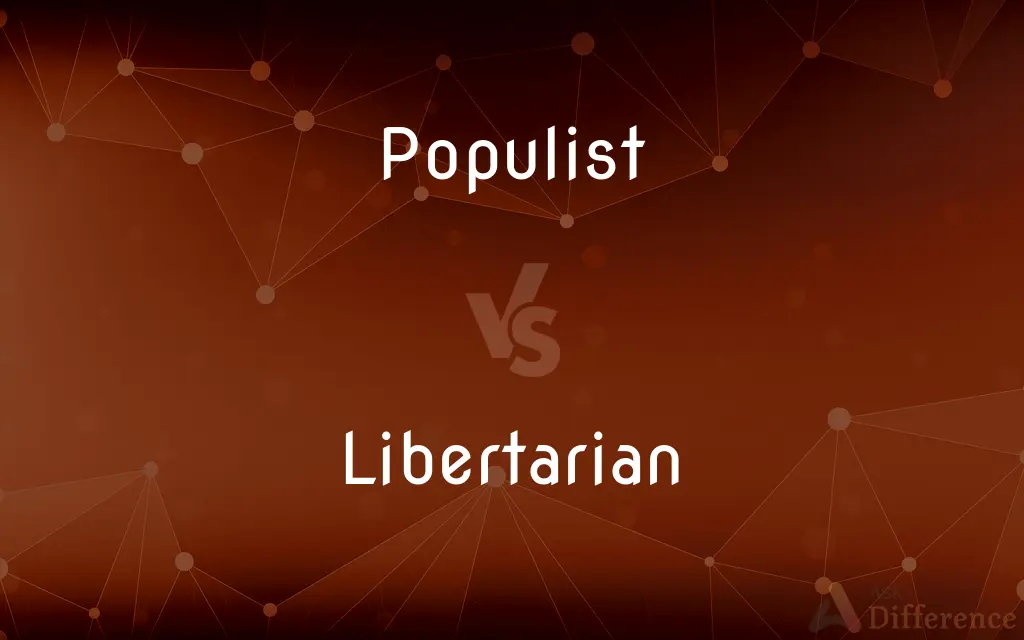Populist vs. Libertarian — What's the Difference?
By Tayyaba Rehman — Updated on October 20, 2023
Populist emphasizes popular will and common people's interests, often involving interventionist policies. Libertarian prioritizes individual liberty and minimal government interference.

Difference Between Populist and Libertarian
Table of Contents
ADVERTISEMENT
Key Differences
Populist generally describes a political stance or movement that champions the cause of ordinary people, often by addressing grievances against the established elite. Libertarian, on the other hand, defines a philosophy that emphasizes individual freedom, autonomy, and limited governmental intervention in personal and economic affairs.
Populist movements can arise from both the political left and right, focusing on voicing the concerns of the "common man" against perceived elite injustices. While some populist policies might involve market interventions or redistributive measures, Libertarian thought consistently advocates for free-market principles and reduced government involvement in the economy.
The Populist approach may favor protectionist trade policies if it believes these protect domestic industries and jobs. In contrast, a Libertarian would typically champion free trade and open markets, viewing them as conduits for economic freedom and prosperity.
Populist movements often emphasize a strong sense of community and shared national identity. They might support policies that they believe reinforce this identity. Libertarian philosophies underscore the value of individual choices, believing that personal liberties should seldom, if ever, be compromised for the sake of collective identity or goals.
When it comes to social policies, a Populist might advocate for policies that resonate with the majority's sentiments, even if these infringe on minority rights. Conversely, a Libertarian consistently supports policies that uphold individual rights, irrespective of majority views.
ADVERTISEMENT
Comparison Chart
Core Principle
Champions ordinary people's interests
Prioritizes individual liberty
Economic Approach
May support market interventions
Advocates free-market principles
Trade Policies
Might favor protectionism
Supports free trade
Social Cohesion
Emphasizes community/national identity
Values individual choices
View on Minority Rights
Might side with majority sentiment
Upholds individual rights consistently
Compare with Definitions
Populist
Relating to a political strategy based on appealing to ordinary people who feel that their concerns are disregarded by established elite groups.
Populist rhetoric often targets the wealthy elites and large corporations.
Libertarian
An advocate of the doctrine of free will and minimal governmental interference.
As a libertarian, she believed in personal freedoms and limited government.
Populist
Relating to or characteristic of a populist or populists.
The politician's speech had a populist tone, emphasizing the needs of everyday people.
Libertarian
A person who advocates civil liberty.
Libertarians often rally against censorship and restrictions on speech.
Populist
Favoring or advocating changes or actions that are popular with the general public.
The government took a populist approach, reducing taxes just before the elections.
Libertarian
An adherent of libertarianism
Libertarian philosophy
Populist
A believer in the doctrine that the majority should have the primary influence in government decisions.
As a populist, he firmly believed in implementing policies that resonated with the majority of citizens.
Libertarian
A person who believes in free will.
Populist
A person, especially a politician, who strives to appeal to ordinary people who feel that their concerns are disregarded by established elite groups
He ran as a populist on an anti-corruption platform
Right-wing populists seem poised to make electoral gains
Libertarian
One who advocates maximizing individual rights and minimizing the role of the state.
Populist
Relating to or characteristic of a political approach that strives to appeal to ordinary people who feel that their concerns are disregarded by established elite groups
A populist opposition leader
Populist tabloid newspapers
Party leaders plan to reprise the populist rhetoric that they used in the tax fight
Libertarian
One who believes in free will.
Populist
A supporter of the rights and power of the people.
Libertarian
One who advocates liberty, either generally or in relation to a specific issue.
Populist
Populist A supporter of the Populist Party.
Libertarian
A believer in right-libertarianism, a political doctrine that emphasizes individual liberty and a lack of governmental regulation, intervention, and oversight both in matters of the economy (‘free market’) and in personal behavior where no one’s rights are being violated or threatened.
Populist
Of or relating to populism or its advocates
A populist aversion to business monopolies.
Libertarian
A left-libertarian, an antiauthoritarian believer in both individual freedom and social justice (social equality and mutual aid).
Populist
Populist Of or relating to the Populist Party.
Libertarian
(philosophy) A believer in the freedom of thinking beings to choose their own destiny, i.e. a believer in free will as opposed to those who believe the future is predetermined.
Populist
A person who advocates populism (a movement against ruling elites who are presumed not to act in the interests of the ordinary citizen).
Libertarian
Having the beliefs of libertarians; having a relative tendency towards liberty.
He has libertarian views.
A libertarian capitalist.
Populist
A politician who advocates specific policies just because they are popular.
Libertarian
(dated) Relating to liberty, or to the doctrine of free will, as opposed to the doctrine of necessity.
Populist
A person who advocates democratic principles.
Libertarian
Pertaining to liberty, or to the doctrine of free will, as opposed to the doctrine of necessity.
Populist
Democratic.
Libertarian
One who holds to the doctrine of free will.
Populist
(of a political policy) Put forward just because it would be popular.
Libertarian
Someone who believes the doctrine of free will
Populist
Of or pertaining to populism.
Libertarian
Supporting beliefs in the doctrine of individual liberty, especially in political and economic matters.
His libertarian stance made him oppose the new regulatory measures.
Populist
A member of the People's party.
Libertarian
Believing in the importance of liberty and autonomous individual choice.
With a libertarian mindset, he campaigned against mandatory health programs.
Populist
An advocate of democratic principles
Libertarian
Pertaining to or reflecting the doctrine of libertarianism.
The book provides a libertarian perspective on economic reforms.
Common Curiosities
How do Populists view trade policies?
Populists might support protectionist policies if they believe they protect domestic industries.
What does Populist emphasize?
Populist emphasizes the rights and interests of the common people, often against the established elite.
Can a Populist also be a Libertarian?
While there may be overlaps in certain beliefs, the core principles of populism and libertarianism often differ, especially regarding government intervention.
How might a Populist address societal issues?
A Populist might promote policies that resonate with the majority's sentiments, sometimes at the expense of minority rights.
Are Populist movements limited to a specific region?
No, Populist movements can arise anywhere where there's perceived disparity between common people and elites.
What's a key tenet of Libertarian economic belief?
Libertarians typically advocate for free-market principles and minimal government interference in the economy.
How do Libertarians view individual rights?
Libertarians place a high emphasis on individual rights and freedoms, irrespective of majority views.
What's the common ground between Populist and Libertarian views?
Both might share a distrust of certain established institutions, though their reasons and solutions can differ.
Is Libertarian left or right-wing?
Libertarianism focuses on individual liberty and can be found on both the left (social issues) and right (economic issues) but is commonly associated with right-wing economic policies.
What's the Libertarian view on censorship?
Libertarians generally oppose censorship, emphasizing freedom of speech and expression.
How do Populists generally view globalism?
Populists might be wary of globalism if they believe it disadvantages the national community.
Can a political party be both Populist and Libertarian?
While not common, a party might adopt certain populist and libertarian ideas; however, reconciling core differences might be challenging.
How might Populists view wealthy elites?
Populists often view wealthy elites with skepticism, seeing them as out of touch with the common person's needs.
How do Libertarians typically view taxation?
Libertarians often support low taxes, seeing them as an infringement on economic freedom.
Do Libertarians support social welfare programs?
Libertarians usually advocate for reduced government spending and might be critical of expansive social welfare programs.
Share Your Discovery

Previous Comparison
Pedicel vs. Petiole
Next Comparison
Belch vs. BurpAuthor Spotlight
Written by
Tayyaba RehmanTayyaba Rehman is a distinguished writer, currently serving as a primary contributor to askdifference.com. As a researcher in semantics and etymology, Tayyaba's passion for the complexity of languages and their distinctions has found a perfect home on the platform. Tayyaba delves into the intricacies of language, distinguishing between commonly confused words and phrases, thereby providing clarity for readers worldwide.
















































